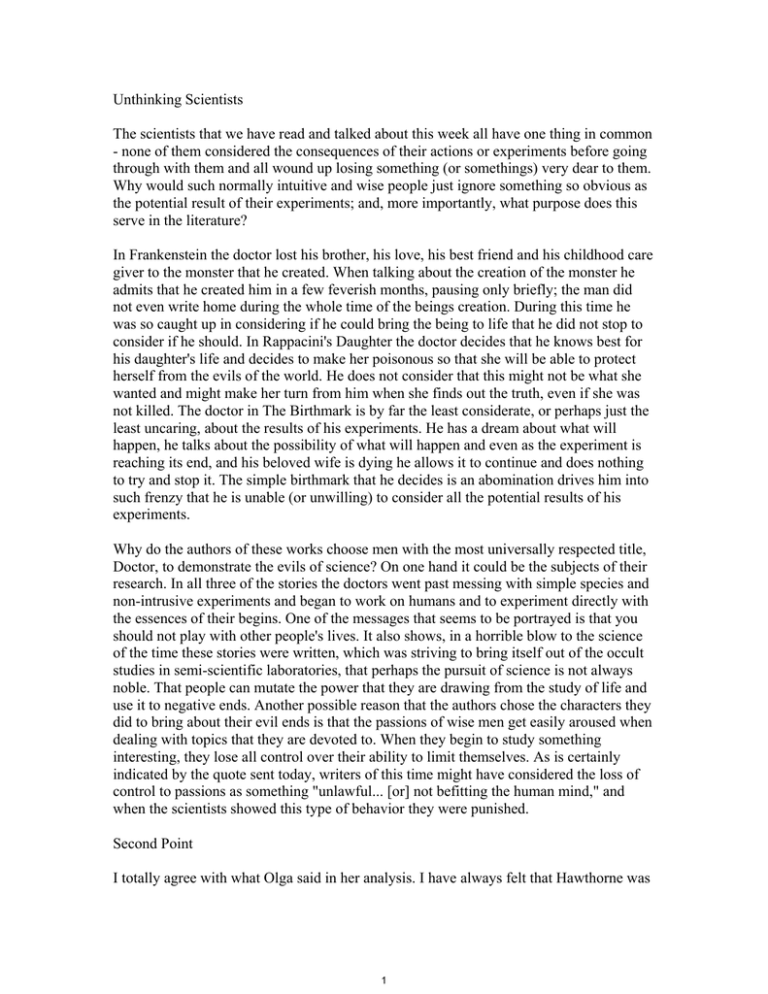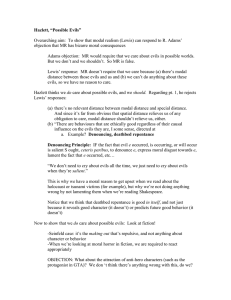Unthinking Scientists
advertisement

Unthinking Scientists The scientists that we have read and talked about this week all have one thing in common - none of them considered the consequences of their actions or experiments before going through with them and all wound up losing something (or somethings) very dear to them. Why would such normally intuitive and wise people just ignore something so obvious as the potential result of their experiments; and, more importantly, what purpose does this serve in the literature? In Frankenstein the doctor lost his brother, his love, his best friend and his childhood care giver to the monster that he created. When talking about the creation of the monster he admits that he created him in a few feverish months, pausing only briefly; the man did not even write home during the whole time of the beings creation. During this time he was so caught up in considering if he could bring the being to life that he did not stop to consider if he should. In Rappacini's Daughter the doctor decides that he knows best for his daughter's life and decides to make her poisonous so that she will be able to protect herself from the evils of the world. He does not consider that this might not be what she wanted and might make her turn from him when she finds out the truth, even if she was not killed. The doctor in The Birthmark is by far the least considerate, or perhaps just the least uncaring, about the results of his experiments. He has a dream about what will happen, he talks about the possibility of what will happen and even as the experiment is reaching its end, and his beloved wife is dying he allows it to continue and does nothing to try and stop it. The simple birthmark that he decides is an abomination drives him into such frenzy that he is unable (or unwilling) to consider all the potential results of his experiments. Why do the authors of these works choose men with the most universally respected title, Doctor, to demonstrate the evils of science? On one hand it could be the subjects of their research. In all three of the stories the doctors went past messing with simple species and non-intrusive experiments and began to work on humans and to experiment directly with the essences of their begins. One of the messages that seems to be portrayed is that you should not play with other people's lives. It also shows, in a horrible blow to the science of the time these stories were written, which was striving to bring itself out of the occult studies in semi-scientific laboratories, that perhaps the pursuit of science is not always noble. That people can mutate the power that they are drawing from the study of life and use it to negative ends. Another possible reason that the authors chose the characters they did to bring about their evil ends is that the passions of wise men get easily aroused when dealing with topics that they are devoted to. When they begin to study something interesting, they lose all control over their ability to limit themselves. As is certainly indicated by the quote sent today, writers of this time might have considered the loss of control to passions as something "unlawful... [or] not befitting the human mind," and when the scientists showed this type of behavior they were punished. Second Point I totally agree with what Olga said in her analysis. I have always felt that Hawthorne was 1 not one for subtly and seemed to pound his points and morals into the heads of the readers. Some teachers I had in high school would teach him after teaching other works that contained symbolism and metaphor in a much smaller degree. The result was similar to one where you are looking for something in a very dark room and suddenly someone turns on all the lights in the room. I find his use of metaphor to be almost painful. Courtesy of Lindsay Hays. Used with permission. 2 MIT OpenCourseWare http://ocw.mit.edu 21L.430 / CMS.920 Popular Narrative: Masterminds Fall 2004 For information about citing these materials or our Terms of Use, visit: http://ocw.mit.edu/terms.


